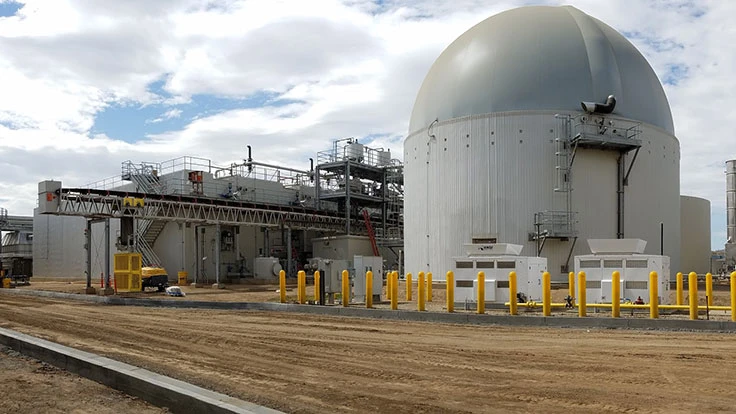
Southern California Gas Co. (SoCalGas), Los Angeles, and waste management company CR&R Environmental, Stanton, California, have announced they broke ground on construction of an eight-inch pipeline that will bring carbon-neutral renewable natural gas into the SoCalGas distribution system for the first time.
The connecting pipeline, funded by CR&R Environmental, will reach approximately 1.4 miles from an existing SoCalGas pipeline to a new CR&R anaerobic digestion facility in Perris, California slated to be complete this spring. Renewable natural gas from the digestion facility will be designated specifically to power CR&R's fleet of approximately 900 waste hauling trucks.
"Bringing renewable gas into our pipeline system is a big step forward for SoCalGas and for California," said Lisa Alexander, SoCalGas' vice president, customer solutions and communications. "Using our pipeline infrastructure to distribute this carbon-neutral fuel will help to slow climate change and meet state goals for increasing use of renewable fuels. We see this de-carbonization of our pipeline system as the way of the future."
SoCalGas expects it will be able to bring renewable gas from the facility into its pipelines by June of this year.
CR&R's Perris anaerobic digester, supplied by Eisenmann USA and Greenlane Biogas and constructed by W.M. Lyles, will use source-separated organic waste collected in cities' green collection carts to produced carbon-neutral renewable methane. This gas will then be further refined using pollution-free technology and distributed through SoCalGas's pipeline infrastructure. Such natural gas can be used to fuel heavy-duty trucks, generate electricity, or fuel heating systems. CR&R's Perris digestion facility is believed to be the largest in the world.
Studies indicate California could produce almost 300 billion cubic feet of renewable natural gas per year just from organic waste. Instead of landfilling or burning that waste, California could use it to generate enough renewable electricity to power 2 to 3 million homes, or enough to replace 75 percent of all the diesel fuel used by motor vehicles in California.
The connecting pipeline, funded by CR&R Environmental, will reach approximately 1.4 miles from an existing SoCalGas pipeline to a new CR&R anaerobic digestion facility in Perris, California slated to be complete this spring. Renewable natural gas from the digestion facility will be designated specifically to power CR&R's fleet of approximately 900 waste hauling trucks.
"Bringing renewable gas into our pipeline system is a big step forward for SoCalGas and for California," said Lisa Alexander, SoCalGas' vice president, customer solutions and communications. "Using our pipeline infrastructure to distribute this carbon-neutral fuel will help to slow climate change and meet state goals for increasing use of renewable fuels. We see this de-carbonization of our pipeline system as the way of the future."
SoCalGas expects it will be able to bring renewable gas from the facility into its pipelines by June of this year.
CR&R's Perris anaerobic digester, supplied by Eisenmann USA and Greenlane Biogas and constructed by W.M. Lyles, will use source-separated organic waste collected in cities' green collection carts to produced carbon-neutral renewable methane. This gas will then be further refined using pollution-free technology and distributed through SoCalGas's pipeline infrastructure. Such natural gas can be used to fuel heavy-duty trucks, generate electricity, or fuel heating systems. CR&R's Perris digestion facility is believed to be the largest in the world.
Studies indicate California could produce almost 300 billion cubic feet of renewable natural gas per year just from organic waste. Instead of landfilling or burning that waste, California could use it to generate enough renewable electricity to power 2 to 3 million homes, or enough to replace 75 percent of all the diesel fuel used by motor vehicles in California.
Latest from Waste Today
- Quest Resource posts Q4 loss, names new CEO
- Indianapolis awards solid waste contract, updates recycling drop-off program
- Kent County, Michigan, highlights hazardous waste disposal programs
- Viably, Turmec partner on Ohio installation
- EPA plans to revisit numerous environmental, climate regulations
- Miami-Dade Innovation Authority launches fifth Public Innovation Challenge
- Fornnax wins Green Innovation of the Year award
- Louisiana city launches glass recycling program





